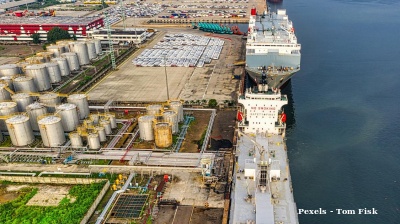As global demand for high-performance chips accelerates, especially in the fields of artificial intelligence and autonomous driving, chipmakers are battling for dominance in next-generation semiconductor manufacturing. In this race, Samsung Electronics has just secured a major win. The South Korean tech giant has signed a $16.5bn chip manufacturing deal with Tesla, a move that could reshape the competitive landscape and revive Samsung’s foundry business after a challenging period, Korea Times reports.
The contract, officially active from July 2025 until December 2033, was revealed in a regulatory filing on July 28. While Samsung did not name the client, citing confidentiality, Tesla CEO Elon Musk confirmed the partnership. Samsung will be responsible for fabricating Tesla’s AI6 chips, which are core to the electric vehicle maker’s next-generation Full Self-Driving (FSD) system.
Production will take place at Samsung’s upcoming facility in Taylor, Texas. Musk highlighted that the plant will be fully dedicated to producing the AI6 chips, which are scheduled to debut in Tesla vehicles in 2027. This new chip is expected to surpass its predecessor, the AI5, in processing complex neural networks, real-time data fusion from sensors, and enabling autonomous driving without human intervention. While TSMC is building the AI5 chip for Tesla this year, Samsung's AI6 production marks a potential comeback in a market it once shared more evenly.
Although details about the AI6 remain confidential, industry observers believe Samsung will use its 2-nanometre process, one of the most advanced chip-making technologies to date. This would represent a leap in processing power, efficiency and competitiveness against Taiwan-based TSMC, the current global leader in chip foundry services.
Since 2019, Samsung has participated in the production of earlier Tesla FSD chips, but recent generations have been manufactured primarily by TSMC using 4- and 5-nanometre processes. However, with Samsung’s 2-nanometre yield rates reportedly improving, Tesla appears to be returning to the Korean manufacturer for its next leap in FSD performance.
Musk also stated that Tesla would actively collaborate with Samsung to improve manufacturing efficiency and scale. He emphasised that the $16.5bn figure is only a base level and that the actual production volume could be significantly higher. "I will walk the line personally," he wrote on X (formerly Twitter), pointing to the deal’s strategic importance.
The scale of the contract is noteworthy. It accounts for roughly 7.6% of Samsung’s estimated 2024 revenue of $222bn, giving the company a multi-year revenue anchor for its foundry division, which has been under pressure. In the second quarter of 2024 alone, Samsung’s foundry and System LSI divisions reportedly posted combined operating losses of around $1.5bn, largely due to underperformance in 3-nanometre production and an inability to attract major long-term clients.
However, Korea Times also stated that momentum appears to be shifting. In a report published on July 21, Kiwoom Securities analyst Pak Yu-ak stated that Samsung’s operating losses could narrow in the coming months. This would be driven by several developments: the introduction of Samsung’s Exynos 2500 chip in the Galaxy Z Flip 7, expected mass production of Apple’s iPhone 18 image sensors in 2026, and new strategic partnerships, including the Tesla deal.
The chips for Tesla will be produced at Samsung’s Texas foundry, which is central to the company’s plan to invest over $37bn in the United States by 2030. The Taylor plant, initially scheduled to begin operations by late 2024, has faced delays due to a lack of confirmed orders. With Tesla now secured as a client, Samsung expects the plant to begin producing chips in 2025.
There is also speculation that Samsung could win additional Tesla orders beyond the AI6. Industry insiders suggest that the foundry may also fabricate the Dojo 2 chips, used for training neural networks behind Tesla’s FSD system. Samsung is also reportedly in talks to manufacture advanced chips for Qualcomm and Nvidia, further strengthening its position in the AI and high-performance computing segment.
This deal reflects more than just a contract win; it suggests a strategic pivot. Samsung has been working to rebuild trust and relationships in North America. Top semiconductor executives, including Jun Young-hyun, head of the Device Solutions division, have travelled repeatedly to the US to meet key clients. The company also recently appointed a former TSMC executive to lead its US foundry operations, showing a clear intent to compete aggressively in the region.
Samsung’s deal with Tesla is more than just a commercial success, it’s a credibility statement. After falling behind TSMC in yield and client wins, Samsung is showing that it still has the technological capability and strategic clarity to compete at the highest level. This move also repositions the company in the AI and autonomous vehicle chip space, which is quickly becoming the next frontier in semiconductor innovation.
The Tesla deal brings revenue stability, an opportunity to fine-tune Samsung’s 2-nanometre process in high-stakes production, and most importantly, a chance to change the narrative. If Samsung can deliver on both yield and timeline, it could use this momentum to secure further deals, regain market confidence, and close the gap with Taiwan's TSMC.
Tech

UAE and India partnership council support startups in both countries
UAE's RAKEZ partners with India economic council to launch startup series supporting entrepreneurship and global expansion opportunities for both countries.

Iranian deputy IT minister admits the local web is "unsafe"
Iranian communications deputy admits filtering policies have created unsafe, polluted internet network whilst domestic messaging platforms show significant growth.

Israeli movie actors targeted in alleged Iranian phishing campaign
Dozens of Israeli actors fall victim to an alleged Iranian phishing campaign disguised as a film casting call, prompting security warnings over identity document theft.

Amazon bets on Rappi to take on MercadoLibre in Latam
Amazon has acquired a stake in Colombian delivery platform Rappi through a $25mn convertible note, gearing up to challenge MercadoLibre's dominance across Latin America's booming e-commerce landscape.




